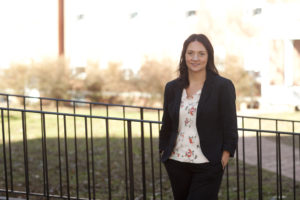Jaime Opanashuk shivered as she stood on Campus Walk asking students to spin a Wheel of Fortune-like disc filled with interpersonal-experience scenarios. If they were the characters described in the story on which they landed, Opanashuk asked, what would they do next?
“My name’s Jaime,” she told those who played the game Monday, reminding them about UMW resources like the Office of Title IX and the Talley Center for Counseling Services. “Tell all your friends.”
Mary Washington’s new victim advocate, Opanashuk would shout her presence from the roof of her Tyler House office if she could. For now, she hopes things like this week’s Cocoa and Consent sexual assault awareness event will help spread the word. In the role, classified as confidential, she’s a bridge between those who’ve experienced sexual assault, misconduct or relationship abuse and their decision to seek counseling, legal advice or other follow-up options.
“I’m the first step,” said Opanashuk, who has a 20-year background in law enforcement and domestic violence. “I see this position as the first place to go when you don’t know what to do.”
Funding for a victim advocate at Mary Washington (the position was first filled last winter) was provided as part of a $300,000 grant from the Justice Department’s Office on Violence Against Women (OVW). UMW was among 45 institutions of higher education—one of only two in Virginia—to receive the funding in the fall of 2016 to help victims of sexual assault, domestic violence and stalking. The advocate works closely with the Talley Center and points students to off-campus resources like Empowerhouse and the Rappahannock Council Against Sexual Assault, where she spends some of her work hours each week.

More than a decade as a probation officer, supervising sex and domestic violence offenders in New York and Oregon, gave Opanashuk a peek inside offenders’ minds. In her work as a child abuse and domestic violence case coordinator, she flipped that perspective to counsel victims. Now, she’ll share her insight with students in college, where violence between intimate partners is prevalent across the nation. One in four women and one in seven men ages 18 and older report having been a victim, according to the National Domestic Violence Hotline.
“I know they’re out there,” Opanashuk said. “We owe it to them to have the services they need. I want to step in and provide resources, intervention and support so that 10 years down the road they aren’t still defining themselves by what they’ve been through.”
Opanashuk holds a bachelor’s degree in criminal justice and psychology from Niagara University, as well as certifications in cognitive behavior, risk assessment, motivational interviewing and more. As a young college grad, she took the helm of both a domestic violence taskforce of 120 community partners in Warsaw, New York, and Wyoming County’s first domestic violence shelter for women and children. Like her victim advocate role at Mary Washington, the position was funded by an OVW grant.
At UMW, Opanashuk said, she wants “every student to feel like they can come into this office and have someone listen to their story and believe them and give them a voice.”

